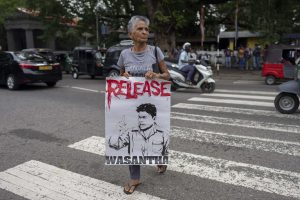Sri Lanka’s government is desperate to quash dissent. It faces opposition on multiple fronts – people protesting onerous austerity measures to combat an economic crisis, survivors of atrocity crimes demanding accountability, and the return of land illegally occupied by the military. Meanwhile, foreign governments are asking Sri Lanka to repeal the draconian Prevention of Terrorism Act (PTA), which the country has used for over 40 years to control nonviolent protests.
In a bid to subdue recalcitrant citizens while also appeasing the international community, Sri Lanka published the Ant-Terrorism Act (ATA) as a bill on March 22. The ATA was presented as a new and improved version of the PTA that became law in 1979. It is, however, old wine in a new bottle.
The crimes set out in the ATA are similar to that in the PTA and have been mainly used to crush dissent for many years.
On March 7, 2008, I – a journalist who had been writing about government human rights violations for 20 years – went looking for my publisher and fellow journalist who had been arrested the previous evening by the Terrorism Investigation Division (TID), notorious for torturing suspects in custody. While there, I was also detained. I was tortured and held for six months without charges. Finally, I was indicted under the PTA – falsely – for inciting racial disharmony through my writing. In a show trial where the prosecution relied solely on a confession wrested through torture, the judge sentenced me to 20 years in prison with hard labor. Due to an international campaign spearheaded by my wife with the involvement of Amnesty International and others, I was pardoned on May 3, 2010 by the then president of Sri Lanka. I was imprisoned for 675 days and never returned to my home in Sri Lanka a free man.
The government’s position is that the ATA, unlike the PTA, will prevent torture in police custody because it empowers magistrates to inspect detention conditions and examine if suspects have been tortured. The ATA also says suspects must be produced before a magistrate 48 hours after arrest who shall interview them in a private or semi-private setting.
If the magistrate suspects torture has occurred and this is confirmed by a judicial medical officer (JMO) – who is a forensic pathologist – the magistrate can bar further contact between the detainee and the police officers who had previous access to the detainee. However, other police personnel have access to the suspect to continue investigations. The suspect could also return to police detention.
In the ATA, the magistrate and JMO’s oversight role appear to be a check on torture. However, from my experience I can confirm that the claim of magisterial and JMO oversight is false.
Under the PTA I should have been produced before a magistrate within 72 hours. I was not. However, a document was presented in court that I had been produced within 72 hours to a different magistrate than the one who was presiding in my case. This document was never questioned although my attorney stated I was not seen by a magistrate. I was also taken to four JMOs before my trial began. I managed to convey to three of them my mistreatment, but only one put it in his report. The police suppressed that report and did not present it to the magistrate.
The magistrate’s authority to inspect detention centers is also not new – it is already a part of the PTA. Critiquing this provision, Human Rights Watch says, “The Human Rights Commission of Sri Lanka told Human Rights Watch it had informed the Supreme Court chief justice that magistrates had made no visits to Criminal Investigation Department and Terrorism Investigation Division detention centres.”
Little has changed since my incarceration. Especially the environment where a magistrate questioning the police is portrayed as unpatriotic because the police and military continue to be seen as sacrosanct protectors of the state and nation. Therefore, after rubberstamping police authority for 40 years, expecting a magistrate to function as a check on police torture under the ATA is fanciful. If torture is to be eradicated in Sri Lanka the institutions of the magistrate and police need to be reformed.
The U.S. has long been calling for human rights protection for Sri Lankan citizens and for accountability for war crimes and crimes against humanity. The U.S. should not have the wool pulled over its eyes by Sri Lanka. While continuing to call for the repeal of the PTA, it should also oppose its replacement by the ATA.
But equally important, the U.S. and the international community should urge reform of institutions and structures of the Sri Lankan state such as the judiciary. Only then can there be true reform where the law is administered equitably and effectively to further human rights.

































